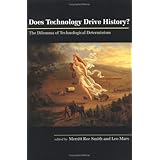
Average Reviews:

(More customer reviews)This collection of essays purportedly addresses the philosophical theory of technological determinism - the belief that human behavior and culture is driven by technology and its unintended (or intended) consequences. Of course, the theory has many nuances and permutations, which are explored in depth by the various writers here. The book starts off with fine introductions to the topic, particularly the opening essay by Merritt Roe Smith and the seminal "Do Machines Make History?" by Robert Heilbroner. Unfortunately the book then descends into standard turgid theoretical obfuscations of dubious usefulness to anyone other than each professor's immediate colleagues. Examples include the standard academic exercise of reinterpreting the ideas of earlier thinkers and calling the results a new theory (Bruce Bimber, Thomas Mina), or forcing existing theories together and taking credit for the resulting "breakthrough" (Rosalind Williams, Leo Marx). Another running issue in this book is a lack of distinction among technology, progress, and modernity, as can be seen in the otherwise fascinating historical report by Michael L. Smith. And as usual for academic books that collect essays by various professors, everybody repeats the basic tenets of the theory at issue before embarking on their particular interpretation or example of interest. One benefit of this book is that the editors (both in their introduction and through the essay selection process) do not try to nail down a particular position on the many nuances of technological determinism, which is healthy for purposes of discussion. Regardless, little is accomplished by the writers except esoteric reinterpretations and feeble grasps for significance. [~doomsdayer520~]
Click Here to see more reviews about: Does Technology Drive History The Dilemma of Technological Determinism
These thirteen essays explore a crucial historical question that has beennotoriously hard to pin down: To what extent, and by what means, does a society'stechnology determine its political, social, economic, and cultural forms?Karl Marxlaunched the modern debate on determinism with his provocative remark that "thehand-mill gives you society with the feudal lord; the steam-mill, society with theindustrial capitalist," and a classic article by Robert Heilbroner (reprinted here)renewed the debate within the context of the history of technology. This bookclarifies the debate and carries it forward.Marx's position has become embedded inour culture, in the form of constant reminders as to how our fast-changingtechnologies will alter our lives. Yet historians who have looked closely at wheretechnologies really come from generally support the proposition that technologiesare not autonomous but are social products, susceptible to democratic controls. Theissue is crucial for democratic theory. These essays tackle it head-on, offering adeep look at all the shadings of determinism and assessing determinist models in awide variety of historical contexts.Contributors : Bruce Bimber. Richard W. Bulliet.Robert L. Heilbroner. Thomas P. Hughes. Leo Marx. Thomas J. Misa. Peter C. Perdue.Philip Scranton. Merritt Roe Smith. Michael L. Smith. John M. Staudenmaier. RosalindWilliams.

0 comments:
Post a Comment